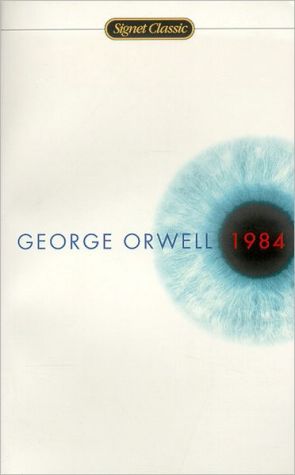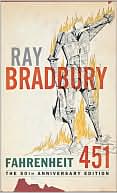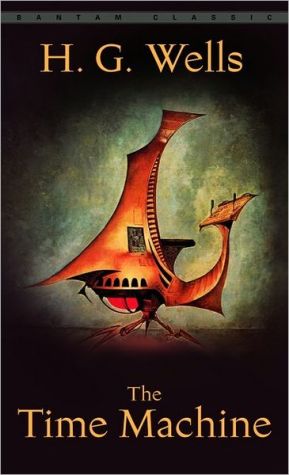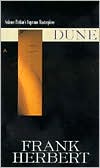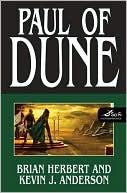Heaven's Reach (New Uplift Series #3)
Winner of the Nebula and Hugo Awards, David Brin brings his bestselling Uplift series to a magnificent conclusion with his most imaginative and powerful novel to date--the shattering epic of a universe poised on the brink of revelation...or annihilation.\ The brutal enemy that has relentlessly pursued them for centuries has arrived. Now the fugitive settlers of Jijo--both human and alien--brace for a final confrontation. The Jijoans' only hope is the Earthship Streaker, crewed by uplifted...
Search in google:
Winner of the Nebula and Hugo Awards, David Brin brings his bestselling Uplift series to a magnificent conclusion with his most imaginative and powerful novel to date—the shattering epic of a universe poised on the brink of revelation...or annihilation.The brutal enemy that has relentlessly pursued them for centuries has arrived. Now the fugitive settlers of Jijo—both human and alien—brace for a final confrontation. The Jijoans' only hope is the Earthship Streaker, crewed by uplifted dolphins and commanded by an untested human.Yet more than just the fate of Jijo hangs in the balance. For Streaker carries a cargo of ancient artifacts that may unlock the secret of those who first brought intelligent life to the Galaxies. Many believe a dire prophecy has come to pass: an age of terrifying changes that could end Galactic civilization.As dozens of white dwarf stars stand ready to explode, the survival of sentient life in the universe rests on the most improbable dream of all—that age-old antagonists of different races can at last recognize the unity of all consciousness.Publishers WeeklyThe final book in Brin's Uplift Storm Trilogy (Infinity's Shore; Brightness Reef) sets space opera against a canvas that spans the galaxies, colored with interstellar conflict and peopled with smart-mouthed chimpanzees, overwhelmed humans and neo-dolphins who form the stalwart crew of the spaceship Streaker. The narrative, which unfolds at frenzied speed, opens with the Earth under attack by an alliance of evil aliens, the essence of space itself shaking apart and the beleaguered Streaker, captained by Dr. Gillian Baskin, trying to outrun a Jophurian battleship that seeks to destroy it. Rescue comes in the unlikely form of a wormhole that delivers the Streaker to the Old Ones, the godlike beings responsible for nurturing sentient life throughout the Five Galaxies and for inaugurating the UpLift process. While Baskin and her crew fear that the Old Ones are offering them "the embrace of gravitational tides," an interplanetary form of comfortable retirement, they learn that in fact they have been selected for a very special purpose: to journey to remote space, where the missing eight of the original Thirteen Civilized Galaxies wait to be contacted. Tension builds and buildsand then stumbles to a stop. Brin fans will find plenty to gorge themselves on here, including Niss Machines, Galactic Library cubes and Zang ship-entities, and Brin does offer answers to riddles he posed as far back as Startide Rising. But his choice of a conclusion for his massive and immensely popular trilogy proves a letdown, and then some. (June)
Part One: The Five Galaxies\ What emblems grace the fine prows of our fast ships?\ How many spirals swirl on the bow of each great vessel, turning round and round, symbolizing our connections? How many are the links that form our union?\ One spiral represents the fallow worlds, slowly brewing, steeping, stewing--where life starts its long, hard climb. Struggling out of that fecundity, new races emerge, ripe for Uplift.\ Two is for starfaring culture, streaking madly in our fast ships, first as clients, then as patrons, vigorously chasing our young interests--trading, fighting, and debating-- Straining upward, till we hear the call of beckoning tides.\ Three portrays the Old Ones, graceful and serene, who forsake starships to embrace a life of contemplation. Tired of manic rushing. Cloistering for self-improvement. They prepare to face the Great Harrower.\ Four depicts the High Transcendents, too majestic for us to perceive. But they exist! Making plans that encompass all levels of space, and all times.\ Five is for the galaxies--great whirls of shining light--our islands in a sterile cosmos, surrounded by enigmatic silence. On and on they spin, nurturing all life's many orders, linked perpetually, everlasting.\ Or so we are assured. . . .\ Harry\ Alarms sing a variety of melodies.\ Some shriek for attention, yanking you awake from deathlike repose. Others send your veins throbbing with adrenaline. Aboard any space vessel there are sirens and wails that portend collision, vacuum leaks, or myriad other kinds of impending death.\ But the alarm tugging at Harry Harms wasn't like that. Its creepy ratchet scraped lightly along the nerves.\ "No rush," the soft buzzer seemed to murmur. "I can wait.\ "But don't even think about going back to sleep."\ Harry rolled over to squint blearily at the console next to his pillow. Glowing symbols beckoned meaningfully. But the parts of his brain that handled reading weren't perfectly designed. They took a while to warm up.\ "Guh . . . ," he commented. "Wuh?"\ Drowsiness clung to his body, still exhausted after another long, solitary watch. How many duras had passed since he had tumbled into the bunk, vowing to quit his commission when this tour of duty ended?\ Sleep had come swiftly, but not restfully. Dreams always filled Harry's slumber, here in E Space.\ In fact, dreaming was part of the job.\ In REM state, Harry often revisited the steppes of Horst, where a dusty horizon had been his constant background in childhood. A forlorn world, where ponderous dark clouds loomed and flickered, yet held tightly to their moisture, sharing little with the parched ground. He usually woke from such visions with a desiccated mouth, desperate for water.\ Other dreams featured Earth--jangling city-planet, brimming with tall humans--its skyscrapers and lush greenery stamped in memory by one brief visit, ages ago, in another life.\ Then there were nightmares about ships--great battlecraft and moonlike invasion arks--glistening by starlight or cloaked in the dark glow of their terrible fields. Wraithlike frigates, looming more eerie and terrifying than real life.\ Those were the more normal dream images to come creeping in, whenever his mind had room between far stranger apparitions. For the most part, Harry's night thoughts were filled with spinning, dizzying allaphors, which billowed and muttered in the queer half-logic of E Space. Even his shielded quarters weren't impervious to tendrils of counterreality, penetrating the bulkheads, groping through his sleep. No wonder he woke disoriented, shaken by the grating alarm.\ Harry stared at the glowing letters--each twisting like some manic, living hieroglyph, gesticulating in the ideogrammatic syntax of Galactic Language Number Seven. Concentrating, he translated the message into the Anglic of his inner thoughts.\ "Great," Harry commented in a dry voice.\ Apparently, the patrol vessel had come aground again.\ "Oh, that's just fine."\ The buzzer increased its tempo. Pushing out of bed, Harry landed barefoot on the chill deck plates, shivering.\ "And to think . . . they tell me I got an aptitude for this kind of work."\ In other words, you had to be at least partway crazy to be suited for his job.\ Shaking lethargy, he clambered up a ladder to the observing platform just above his quarters--a hexagonal chamber, ten meters across, with a control panel in the center. Groping toward the alarm cutoff, Harry somehow managed not to trigger any armaments, or purge the station's atmosphere into E Space, before slapping the right switch. The maddening noise abruptly ceased.\ "Ah . . . ," he sighed, and almost fell asleep again right there, standing behind the padded command chair.\ But then . . . if sleep did come, he might start dreaming again.\ I never understood Hamlet till they assigned me here. Now I figure, Shakespeare must've glimpsed E Space before writing that "to be or not to be" stuff.\ . . . perchance to dream . . .\ Yup, ol' Willie must've known there's worse things than death.\ Scratching his belly, Harry scanned the status board. No red lights burned. The station appeared functional. No major reality leaks were evident. With a sigh, he moved around to perch on the seat.\ "Monitor mode. Report station status."\ The holo display lit up, projecting a floating blue M, sans serif. A melodious voice emanated from the slowly revolving letter.\ "Monitor mode. Station integrity is nominal. An alarm has been acknowledged by station superintendent Harry Harms at 4:48:52 internal subjective estimate time. . . ."\ "I'm Harry Harms. Why don't you tell me something I don't know, like what the alarm's for, you shaggy excuse for a baldie's toup . . . ah . . . ah . . ."\ A sneeze tore through Harry's curse. He wiped his eyes with the back of a hirsute wrist.\ "The alarm denoted an interruption in our patrol circuit of E Level hyperspace," the monitor continued, unperturbed. "The station has apparently become mired in an anomaly region."\ "You mean we're grounded on a reef. I already knew that much. But what kind of . . ." He muttered. "Oh, never mind. I'll go see for myself."\ Harry ambled over to a set of vertical louvered blinds--one of six banks that rimmed the hexagonal chamber--and slipped a fingertip between two of the slats, prying them apart to make a narrow slit opening. He hesitated, then brought one eye forward to peer outside.\ The station appeared to be shaped in its standard format, at least. Not like a whale, or jellyfish, or amorphous blob, thank Ifni. Sometimes this continuum had effects on physical objects that were gruesomely bizarre, or even fatal.\ On this occasion the control chamber still perched like a glass cupola atop an oblate white spheroid, commanding a 360-degree view of a vast metaphorical realm--a dubious, dangerous, but seldom monotonous domain.\ Jagged black mountains bobbed in the distance, like ebony icebergs, majestically traversing what resembled an endless sea of purple grass. The "sky" was a red-blue shade that could only be seen on E Level. It had holes in it.\ So far so good.\ Harry spread the slats wider to take in the foreground, and blinked in surprise at what he saw. The station rested on a glistening, slick brown surface. Spread across this expanse, for what might be a kilometer in all directions, lay a thick scattering of giant yellow starfish!\ At least that was his first impression. Harry rushed to another bank of curtains and peeked again. More "starfish" lay on that side as well, dispersed randomly, but thickly enough to show no easy route past.\ "Damn." From experience he knew it would be useless to try flying over the things. If they represented two-dimensional obstacles, they must be overcome in a two-dimensional way. That was how allaphorical logic worked in this zone of E Space.\ Harry went back to the control board and touched a button. All the blinds retracted, revealing an abrupt panoramic view. Mountains and purple grass in the distance. Brown slickness closer in.\ And yes, the station was completely surrounded by starfish. Yellow starfish everywhere.\ "Pfeh." Harry shivered. Most of the jaundiced monsters had six arms, though some had five or seven. They didn't appear to be moving. That, at least, was a relief. Harry hated ambulatory allaphors.\ "Pilot mode!" he commanded.\ With a faint crackling, the floating helvetica M was replaced by a jaunty, cursive P.\ "Aye aye, o' Person-Commander. Where to now, Henry?"\ "Name's Harry," he grunted. The perky tones used by pilot mode might have been cheery and friendly in Anglic, but they came across as just plain silly in Galactic Seven. Yet the only available alternative meant substituting a voice chip programmed in whistle-clicking GalTwo. A Gubru dialect, even. He wasn't desperate enough to try that yet.\ "Prepare to ease us along a perceived-flat course trajectory of two forty degrees, ship centered," he told the program. "Dead slow."\ "Whatever you say, Boss-Sentient. Adapting interface parameters now."\ Harry went back to the window, watching the station grow four huge wheels, bearing giant balloon tires with thick treads. Soon they began to turn. A squeaky whine, like rubbing your hand on a soapy countertop, penetrated the thick crystal panes.\ As he had feared, the tires found little traction on the slick brown surface. Still, he held back from overruling the pilot's choice of countermeasures. Better see what happened first.\ Momentum built gradually. The station approached the nearest yellow "starfish."\ Doubt spread in Harry's mind.\ "Maybe I should try looking this up first. They might have the image listed somewhere."\ Once upon a time, back when he was inducted as Earth's first volunteer-recruit in the Navigation Institute survey department--full of tape-training and idealism--he used to consult the records every time E Space threw another weird symbolism at him. After all, the Galactic civilization of oxygen-breathing races had been exploring, cataloging, and surveying this bizarre continuum for half a billion years. The amount of information contained in even his own tiny shipboard Library unit exceeded the sum of all human knowledge before contact was made with extraterrestrials.
\ Publishers Weekly - Publisher's Weekly\ The final book in Brin's Uplift Storm Trilogy (Infinity's Shore; Brightness Reef) sets space opera against a canvas that spans the galaxies, colored with interstellar conflict and peopled with smart-mouthed chimpanzees, overwhelmed humans and neo-dolphins who form the stalwart crew of the spaceship Streaker. The narrative, which unfolds at frenzied speed, opens with the Earth under attack by an alliance of evil aliens, the essence of space itself shaking apart and the beleaguered Streaker, captained by Dr. Gillian Baskin, trying to outrun a Jophurian battleship that seeks to destroy it. Rescue comes in the unlikely form of a wormhole that delivers the Streaker to the Old Ones, the godlike beings responsible for nurturing sentient life throughout the Five Galaxies and for inaugurating the UpLift process. While Baskin and her crew fear that the Old Ones are offering them "the embrace of gravitational tides," an interplanetary form of comfortable retirement, they learn that in fact they have been selected for a very special purpose: to journey to remote space, where the missing eight of the original Thirteen Civilized Galaxies wait to be contacted. Tension builds and buildsand then stumbles to a stop. Brin fans will find plenty to gorge themselves on here, including Niss Machines, Galactic Library cubes and Zang ship-entities, and Brin does offer answers to riddles he posed as far back as Startide Rising. But his choice of a conclusion for his massive and immensely popular trilogy proves a letdown, and then some. (June)\ \ \ \ \ VOYA - Ann Welton\ Following his auspicious beginning in Brightness Reef (Bantam Spectra, 1995/VOYA April 1996), Brin completes his Uplift Trilogy with Infinity's Shore followed by Heaven's Reach. The second volume, exhibiting the author's prodigious strengths in world building, characterization, and plot line, takes Brin's engaging cast of characters from the surface of the planet Jijo to both the depths of the sea and the stars. Using shifting points of view, narrator, and voice, the reader follows numerous groups of native Jijoans as they battle for their endangered planet. For centuries, native religion has taught that the settlers on Jijo-there against an intergalactic injunction that set Galaxy Four aside as fallow-will be punished by Star Gods for their willful incursion. The Jijoans' way of life has centered around keeping their settlements disguised and their impact on the environment low. Their faith states that the only way to escape the wrath of the intergalactic authorities is to regress, to become simple and presapient, ready for another cycle of Uplift by a Patron race. These beliefs are instinctively countered when Jijo is attacked-first by gene raiders masquerading as benevolent leaders and then by the powerful and malignant Jophur, an evolved form of Jijo's gentle traeki rings. The plot follows a group of adventurous kids-wheeled, horse-like, or crablike-from the various races who settled Jijo illegally, as they descend to the depths of the Midden (a vast undersea dump) to find an item of value to their civilization. Instead, the youngsters are taken aboard a spaceship from Earth, the Streaker. Crewed by humans and dolphins, Streaker has been running from authorities across galaxies for three years, possessed of a secret that runs counter to the religious beliefs of the powers that be. Meanwhile, plot threads follow an intertwined set of characters-one a converted gene raider from the first invasion-who are trying to help save Jijo. The final volume takes the characters off Jijo and into space, where the Streaker's headlong journey brings the characters and the plot together in a climax that creates chaos in entire galaxies. It is rare for a well-written trilogy to fall down in the final volume, but this one does. Shorter than the first two volumes, the completing volume suffers from the repetition of facts and plot elements that any reader who has been with this book (much less the entire series) for more than five chapters already knows. Perhaps it is the process of un-mooring the book from Jijo, a beautifully-realized setting which is a character in itself, that is partly responsible for the less engaged storytelling of Heaven's Reach. Perhaps the inclusion of myriad scientific facts, related by a holographic entity called the Niss Machine, impedes the plot. Whatever the case, Heaven's Reach seems plodding and pedantic compared to the lithesome prose and can't-put-it-down readability of the first two volumes. The ending does tie up loose ends and provide satisfying, though complex, explanations. Any reader who has read the first two volumes will, of course, wish to read the third. Note: This review was written and published to address two titles: Heaven's Reach and Infinity's Shore. VOYA Codes: 4Q 4P J S (Better than most, marred only by occasional lapses, Broad general YA appeal, Junior High-defined as grades 7 to 9 and Senior High-defined as grades 10 to 12).\ \ \ Mark ShainblumHeaven's Reach and its predecessor volumes are still extremely entertaining books because of the sheer richness of the background information. \ — SF Site\ \ \ \ \ Kirkus ReviewsFinal installment—the individual entries (Brightness Reef, 1995; Infinity's Shore, 1996) aren't particularly intelligible in their own right—of Brin's vast yarn about planet Jijo and its six alien races, all illegal immigrants living in terror of a visitation from the rulers of the Five Galaxies. The general idea is that the galaxy's older and wiser species, or "patrons," like to "uplift" lesser racesþthat is, raise them into full sentience by providing extra brains, speech mechanisms, and suchlike. So, from Earth come not only humans but uplifted neo-chimps and neo-dolphins, too. Brin does provide a cast list and a glossary, whereas even for regulars a plot summary would have been much more useful. Since Brin wrote the charming and inspiring The Postman (1985), his novels have grown ever more impenetrable and overambitious; like the rest of the trilogy, this one's hard to get into, hard to follow, and difficult to care about.\ \

